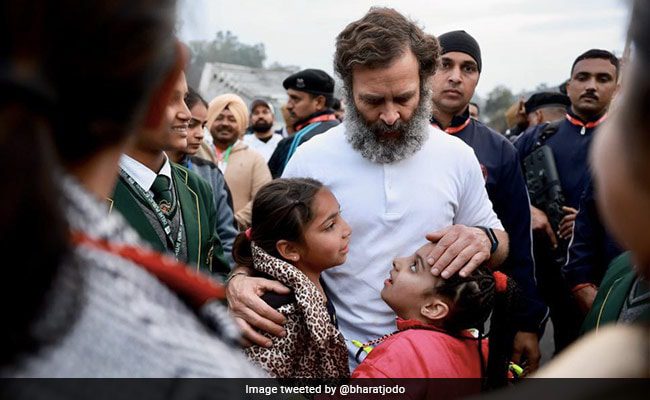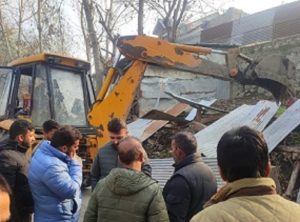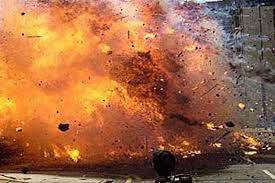
Rahul Gandhi’s ‘Historic’ Kashmir Yatra won’t be a smooth affair?
By: Rasheed Kidwai
As Rahul Gandhi’s Bharat Jodo Yatra enters Kashmir, it is a nostalgic moment for the Gandhis, Abdullahs and many old timers, though the ground conditions and political realities of the state have been altered beyond recognition.
At the time of the Independence, there were three major regional parties in the country — the National Conference (NC), the Shiromani Akali Dal (SAD) and the Dravida Munnetra Kazhagam (DMK). Seventy-six years later, when the Congress is politically losing its domination as a national party, the grand old party seems hopelessly dependent upon some of these regional parties. The Bharat Jodo Yatra was kicked off by DMK chief minister MK Stalin at Kanyakumari and set to conclude at Srinagar where Farooq Abdullah would be present as a father figure, hand-holding Rahul and the Congress.
Though Jammu and Kashmir Assembly polls have not been formally announced, there is a growing consensus that elections are round the corner. As a result, the Congress and the NC are closing ranks. Veteran Farooq Abdullah said to have comforted Gandhis and the Congress that he and NC would do everything possible to checkmate rebel Ghulam Nabi Azad. Farooq Abdullah’s presence at the Bharat Jodo Yatra also caught the eyes of many Kashmir watchers. Interestingly, Azad and Mufti Mohammad Sayeed were crucial factors that had led to bitter parting between the Gandhis and Abdullahs on 2 July 1984. Farooq was the chief minister and Rajiv Gandhi, a major influencer in the Indira government. On 2 July 1984, Governor Jagmohan summoned Farooq to inform that his party had lost its majority in the state Assembly through the defection of thirteen Members of the Legislative Assembly (MLAs), twelve belonging to the National Conference and one independent. Jagmohan asked Farooq Abdullah to step down without letting him test his support on the floor of the Assembly.
Two years later in November 1986, Rajiv and Farooq who had almost grown up together, signed an accord that reinstated Farooq as the chief minister, a move that Azad, Mufti and Arun Nehru deeply resented. In protest, Mufti, who was a Union minister in Rajiv’s cabinet, floated the People’s Democratic Party (PDP), now led by his daughter Mehbooba. The state Assembly elections in March 1987 were seen as a referendum on the Rajiv-Farooq Accord. While the alliance was returned to power with an overwhelming majority — 40 for the NC and 26 for the Congress — there were allegations of massive rigging and electoral malpractices.
Kashmir was the place where Rahul’s grandmother Indira and grandfather Feroze had gone for their honeymoon in 1942. Thinking of her father in the sweltering heat of Allahabad, Indira sent her a telegram, “Wish we could send you some cool breezes from her.” Nehru promptly replied, “Thanks. But you have no mangoes.” By September 1942, both Indira and Feorze were in jail.
Rahul’s great grandfather Jawaharlal Nehru, himself a Kashmiri, had special bond with Sheikh Mohmmad Abdullah, who had played a pivotal role in Kashmir’s integration with the rest of the country at the time of Independence. Nehru used to greatly acknowledge and value Abdullah’s ability to take along with him ordinary Kashmiris, who were opposed to siding with Muslim Pakistan in exchange for a secular autonomous state. Abdullah was appointed head of the “emergency administration” in Jammu and Kashmir the maharaja of the erstwhile Kashmir riyasat had dithered and Pakistan had tried to take over parts of J&K by force. As a token of appreciation, the Nehru government was generous with economic safeguards and promised to recognise Kashmir’s unique status and protect its culture. Abdullah was crowned “Wazir-e-Azam” (Prime Minister) of the Indian state of Jammu and Kashmir.
In October 1947, Nehru and Abdullah attended a massive rally at Lal Chowk in Srinagar, where they took a pledge of identity and the state’s everlasting bond with the rest of the country. “I want you to believe that Kashmir is yours,” Abdullah told Nehru at the meeting. “No power in the world can separate us. Every Kashmiri feels that he is an Indian and that India is his homeland.”
In 1948, Abdullah travelled to Paris as a member of the Indian delegation to attend a meeting of the UN Security Council where the future of Kashmir was to be discussed. He defended the legality of his government. Addressing the Paris meeting, he said: “We would prove before the Security Council that Kashmir and the people of Kashmir have lawfully and constitutionally acceded to the Dominion of India, and Pakistan has no right to question that accession.” It must have been sweet music for India to hear Kashmir’s Prime Minister and delegate to the UN stir citizens and outsiders alike with his patriotic oratory, especially his choice of words: the “fountain-head of basic laws laying the foundation of a just social order and safeguarding the democratic rights of all the citizens of the State”.
On his return from Paris, in March 1948, Abdullah was formally sworn in as the Prime Minister of Kashmir and soon launched a large-scale reform programme for the state. The zamindari system was abolished and the estates of big landowners were taken over by the state to be distributed among the landless. The people were also given debt relief.
However, what triggered the crisis was an intelligence report sent by Bhola Nath Mallick, Nehru’s handpicked head of the IB, that Abdullah had left on 8 August for Gulmarg to meet a representative of Pakistan. In Volume 5 of The Papers of Adlai Stevenson (edited by W Johnson), it is mentioned that some Indian leaders believed that the wife of the US ambassador stationed in New Delhi, Mrs Loy Henderson, and some CIA agents had encouraged Abdullah to toy with the idea of an independent state.
Abdullah was arrested, triggering sharp reactions not only from Pakistan but also from the United Kingdom and the United States. In the subsequent Kashmir Conspiracy case, the Union home ministry, police and intelligence agencies worked assiduously to establish that Abdullah was collaborating with external forces, namely Pakistan, UK and the US, to secede from India.
Bakshi Ghulam Mohammad, who succeeded Abdullah as Prime Minister of Jammu and Kashmir, ruled till early 1964. The ties between the Indian National Conference and the National Conference remained firm. When a “Kamraj Plan”, mooted in the Congress in May 1963, led to the resignation of senior Union ministers and chief ministers of party-ruled states, Ghulam Mohammed who was not part of the Congress belonged to the National Conference — but was still resigned in order to strengthen Nehru’s hand. When someone had taunted him for not being a member of the Congress, Bakshi Ghulam Mohammad had reportedly taken out a ‘chavanni’ [ 25 paisa coin] from his coat pocket to say, “please make me char aana member of the Congress!”
Rajiv Gandhi as leader of Opposition in 1990 had led a parliamentary delegation to Srinagar when VP Singh, supported by the BJP and the Left, allowed governor Jagmohan to let Kashmiri Pandits out of the Valley. The day Rajiv Gandhi, Devi Lal, George Ferandes and others reached Srinagar, the separatists had declared a bandh. When the delegation drove from the airport to the Centaur Hotel on the bank of the Dal Lake and entered the hotel, there was a hostile reception. Some members of the delegation reportedly asked for time, the attendants gave the Pakistan standard time. The delegation could not go out of the hotel due to precarious security arrangements. After returning to Delhi, Rajiv Gandhi told Prime Minister VP Singh that Governor Jagmohan had no political understanding of the situation. Singh then appointed George Fernandes as the Minister of Kashmir affairs.
In 2009, when Omar Abdullah was sworn in as chief minister of a National Conference-Congress coalition government in Jammu and Kashmir, both Rahul and Sonia Gandhi were present at the General Zoravar Singh Stadium in Jammu.
Rahul was again in J&K on 25 August 2019 when a high drama unfolded at the Srinagar airport as Opposition leaders led by Congress MP Rahul Gandhi reached to assess the situation in Jammu and Kashmir following the bifurcation of the state and abrogation of article 370. As soon as Rahul Gandhi alighted from the flight with a dozen of Opposition leaders and dozens of media personnel, he was received by scores of police personnel inside the airport. In 1990, Rajiv Gandhi could not step out of the hotel and 29 years later, Rahul could not step out of the airport.
Would Bharat Jodo make some promising and fresh beginnings in Kashmir? Looks a tough call given the baggage of history and the poor track record.

